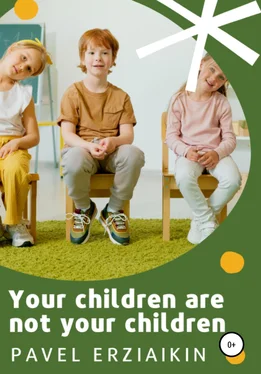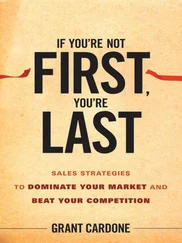Start living yourself, living the children’s lives – get down on your knees and crawl together, look at them, watch them, feel them and join them. Just for a second try to forget about the project of „how it should be“ and start being, living, seeing, feeling and realizing. Not only feeding and getting dressed, but watching to see what my children are doing now, why they are doing it, and why it is important for them. If you spend some time not controlling, evaluating and harping on the same old theme, you will be able to see the process of life cognition, the discovery of the world by these little people. At that time, you just have to be there, supporting.
We become wise parents when we understand what’s happening: what is the child doing, what for, what will the consequences be? Then, we say „no,“ not because this is right for someone, but because we start feeling, seeing, realizing, that this is the only thing to do now. If the snake is crawling to the child, you have to push the child away from it with all your strength. The child can be hurt, can be afraid because of suddenness, can cry, but you have to do it. Let other people criticize you for being rude and violent. Let the child take offence and go into hysterics. The main thing is that you know what you are doing.
There is no „right,“ no „wrong.“ There is what is appropriate and what is irrelevant, what is necessary and what is excessive, what is sufficient and what is surplus, what is effective and what is purposeless. Relying on the obviousness of the situation, on „here and now“, I never think what is „right.“ Inside myself I feel if it’s worth interfering or not. When I feel it, I don’t care about other people’s advice, about how I look like in their eyes. Then, there is no pretense and formal upbringing for the public: I heard the noise, came to the children’s room, shouted, returned to the guests and they told me with respect, „How strict you are with them! Good job!“
You can’t please everyone. There is a nice story about an old man, a child and a donkey. They were walking down the street and the passers-by said, „Look! They’ve bought an animal, but they aren’t using it.“ So the child got on the donkey and they went further. Again they heard the words of disapproval, „Look at these young people nowadays – an old man is walking, but a child is riding.“ They got embarrassed, and they changed their places round the corner. Again people were displeased, „The young man has got all his life ahead of him, but he’s walking on foot wearing his feet to blood, but the old man hasn’t lived enough yet!“ And so on. You can walk all your life and listen to what is right and what is wrong. What is right for one will be wrong for the other. There is nothing absolute. They say it’s bad to kill people, but medals are awarded for this during the war. Everything is appropriate somewhere and not appropriate somewhere else. Somewhere it’s a cure; somewhere it’s poison. When doctors are helpless, mother takes a child and rushes to the sorceress, though it’s wrong and unscientific. But she does it because the result is important – the child must get well. There is no absolute good or bad. Everything works with relevant dosage, circumstances and situation. At the moment when you must do something, you don’t think about what’s right or wrong. You just do it, and then, afterwards, it may turn out that you were right.
I want parents to be investors, not users. Children aren’t expenses, but investments. You invest energy, money, time and emotions into children. Think, when is it not in vain? Why are you doing it? What do you want to get? When you answer these questions to yourself, what you do is purposeful. You want your children to be physically, psychically and socially healthy. What can be the problem? When there is no such health. How can you understand it? You understand through collaboration, friendship and support interacting with children, talking to and watching them. The norm is our active and creative part in life, relevant action that we do here and now, our inner willingness to be in touch with children, understand and realize what’s happening to them, what they feel, what is important for them and what they are engaged in. We are normal, wise and adequate parents, when we stop pretending inside and working for the public, when we set free a certain space for what Tolstoy was writing about: a person can’t be taught to love, you just can remove the obstacles along the way of manifestation of love.
Questions
My son started working, but having his own money, he doesn’t share with the family. I think he should take part in the family expenses, but he is of a different opinion. How can I make him change his mind?
Why do you think you have the right to command his money? Do you think that way he should pay for his happy childhood? Expectations don’t work anyway. If you expected your child to start working and giving you part of his salary, then you had to tell him about that at the beginning. Expectations not having been clarified always end up in an offence, „partisan’s war,“ revenge and fear. You should make the situation clear, „Why do you start working? What do you want? How much will you earn? Are you ready to support the family budget? Or will you live apart and earn your living?“ You didn’t clarify anything, the child started working, received his money and suddenly learned that he had to give it to you. In other words, his mother thinks, „I want a new fur coat. Where can I get money? I’ll take from my husband and my son,“ but she doesn’t notify anybody about that. However, the child has his own plans for his money. So it happens that there’s one wage, but two plans for it. You demand, he resists, and you start racketeering, threating and blackmailing. If you don’t talk to your child, don’t negotiate, but present him with a fait accompli, you deprive yourself of clarity, stay among your own illusions, and when you face the reality, you get stressed and start attacking your child even more furiously.

Cash Dispenser
My daughter is always asleep – she goes to bed early, but still it’s difficult to wake her up to school in the morning. When she comes back home from school – she naps for an hour again. I think this isn’t normal. Is she lazy, or has she had problems at school? What should I do?
Since it suddenly started bothering you, then it must have appeared quite recently. It may be connected with some hormonal disorders, but if doctors have already examined her and told you that somatically she’s healthy, we’ll have a look at the psychological part of the case. She might get too tired. School stress is considered to be average, so for some students it’s easy, but for others it’s beyond the limits. If it’s too heavy for your daughter, then sleep is the way to protect her brain from overload. I don’t think it’s a sign of laziness. Laziness is a social diagnosis, but even lazy people wake up when something meaningful and personally important for them happens. Maybe your daughter isn’t interested in what she is doing. Nothing in her life excites her, and that’s why she often sleeps. But we also can’t ignore the fact that the number of hours she sleeps, that seems too much for you, is her individual norm and need.
My child has to go to school next year, but he doesn’t like books, doesn’t want to learn the letters, while most children of his age can write, read and are ready for school. What should I do?
If he can’t read and write now – he will learn. There is the first school year for that. The majority of children learn quickly at school, because it’s easier to study in a group, than at home, alone, with biased parents, who don’t have teaching skills, relying on their own views about the child’s development at a certain age. In the kindergarten my daughter attended, they told parents, „We play and study with your children the whole day and they come home to relax. Please, don’t educate and don’t teach them anything. Give them some rest.“
Читать дальше











